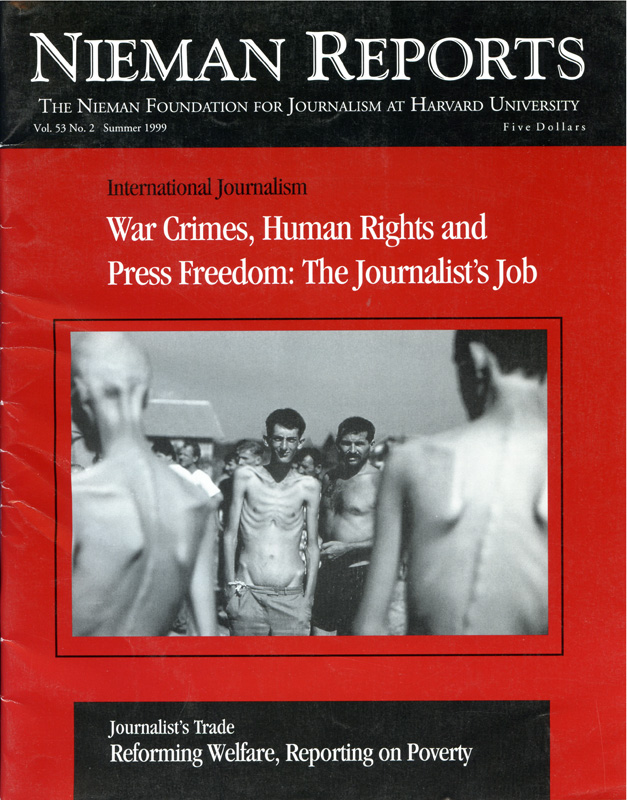International Journalism
Ethnic conflict in the Balkans provides examples of crimes of war and abuses of human rights that journalists are being increasingly called upon to cover. A new book entitled “Crimes of War: What the Public Should Know,” edited by Roy Gutman and David Rieff, was created to educate the news media and others about violations of humanitarian law. This book is commented on by Ellen Hume, former Executive Director of PBS’s Democracy Project and Harvard’s Shorenstein Center on the Press, Politics and Public Policy, and by John Shattuck, United States Ambassador to the Czech Republic and the former Assistant Secretary of State for Democracy, Human Rights and Labor.
Our focus then turns to examining the plight of journalists and media institutions covering the war in Yugoslavia. Dragan Cicic, a Yugoslav journalist who worked for B92, an independent radio station that was shut down by Pres. Slobodan Milosevic, writes about the death of journalism in Serbia. Ardian Arifaj, Editor of the Albanian-language newspaper KOHA Ditore, once published in Kosovo, tells of its rebirth in exile in Macedonia. Chris Hedges, who reported on the Balkans for The New York Times, explores dilemmas journalists confront in writing “the truth” of what they see. Michael Kirkhorn, Director of the Journalism Program at Gonzaga University, questions the role journalists should assume as moral arbiters. Mark Lewis, a former Voice of America correspondent, offers a glimpse at how VOA brings news to Balkan listeners. Reflections from Balkan journalists, compiled from excerpts of their Internet correspondence, follow. Then photographer David Brauchli shows in his images and tells in his words what it’s been like to cover this story. Finally, journalists talk about how they cope with their emotional reactions while reporting on the casualties and cruelties of war.
Journalists then address the topic of press freedom and media responsibility. Ugandan newspaper editor Charles Onyango-Obbo reports on how his government took him to court as an act of intimidation after an unfavorable story was published. Wilson Wanene, a Kenyan-born freelance journalist, writes about a media journal in Kenya that is keeping a watchful eye on how doggedly journalists are using their emerging press freedom. In Chile, Mirko Macari, a reporter with the magazine El Sábado, explains why it is so difficult for reporters to write about the current court case involving General Augusto Pinochet. And Dimitri Mitropoulos, a political correspondent for To Vima, a newspaper in Athens, uses the experience in Greece to offer insight into how media might handle the arrival of Balkan refugees into their countries.
Ethnic conflict in the Balkans provides examples of crimes of war and abuses of human rights that journalists are being increasingly called upon to cover. A new book entitled “Crimes of War: What the Public Should Know,” edited by Roy Gutman and David Rieff, was created to educate the news media and others about violations of humanitarian law. This book is commented on by Ellen Hume, former Executive Director of PBS’s Democracy Project and Harvard’s Shorenstein Center on the Press, Politics and Public Policy, and by John Shattuck, United States Ambassador to the Czech Republic and the former Assistant Secretary of State for Democracy, Human Rights and Labor.
Our focus then turns to examining the plight of journalists and media institutions covering the war in Yugoslavia. Dragan Cicic, a Yugoslav journalist who worked for B92, an independent radio station that was shut down by Pres. Slobodan Milosevic, writes about the death of journalism in Serbia. Ardian Arifaj, Editor of the Albanian-language newspaper KOHA Ditore, once published in Kosovo, tells of its rebirth in exile in Macedonia. Chris Hedges, who reported on the Balkans for The New York Times, explores dilemmas journalists confront in writing “the truth” of what they see. Michael Kirkhorn, Director of the Journalism Program at Gonzaga University, questions the role journalists should assume as moral arbiters. Mark Lewis, a former Voice of America correspondent, offers a glimpse at how VOA brings news to Balkan listeners. Reflections from Balkan journalists, compiled from excerpts of their Internet correspondence, follow. Then photographer David Brauchli shows in his images and tells in his words what it’s been like to cover this story. Finally, journalists talk about how they cope with their emotional reactions while reporting on the casualties and cruelties of war.
Journalists then address the topic of press freedom and media responsibility. Ugandan newspaper editor Charles Onyango-Obbo reports on how his government took him to court as an act of intimidation after an unfavorable story was published. Wilson Wanene, a Kenyan-born freelance journalist, writes about a media journal in Kenya that is keeping a watchful eye on how doggedly journalists are using their emerging press freedom. In Chile, Mirko Macari, a reporter with the magazine El Sábado, explains why it is so difficult for reporters to write about the current court case involving General Augusto Pinochet. And Dimitri Mitropoulos, a political correspondent for To Vima, a newspaper in Athens, uses the experience in Greece to offer insight into how media might handle the arrival of Balkan refugees into their countries.



